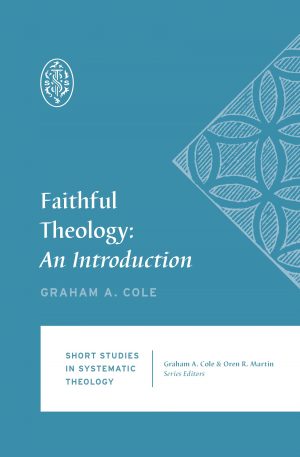Faithful Theology is the first book in Crossway’s Short Studies in Systematic Theology series. The purpose of each book is to “(1) introduce the doctrine [under examination], (2) set it in context, (3) develop it from Scripture, (4) draw the various threads together, and (5) bring it to bear on the Christian life.” Volumes already published or in the works examine the Trinity (which I reviewed here), God’s attributes, the person of Christ, the Holy Spirit, and the church.
Faithful Theology differs from the other volumes in that it deals with theological method rather than a theological doctrine. As Graham A. Cole writes, “This book is about the method to use in doing faithful theology: faithful to God, faithful to God’s word.” More specifically, it focuses on the move “from Scripture to doctrine.”
Here is the book’s table of contents:
- The Word of Revelation
- The Witness of Christian Thought and Practice
- The World of Human Brokenness
- The Work of Wisdom
- The Way of Worship: Putting It all Together in Thought and Life
Cole’s method is similar to what Albert C. Outler called “the Wesleyan Quadrilateral” of Scripture, tradition, experience, and reason. However, Cole takes pains to note that these elements are not equal. Scripture is norma normans (“a norming norm”), while the others are norma normata (“a normed norm”).
Moreover, Cole emphasizes that the goal of theology is worship. “Faithful thinking ought not to be divorced from faithful living,” he writes. Here, he understands worship not merely as the religious devotion we offer to God, but the entire manner in which we live.
Cole acknowledges that the logical order of theological method is Scripture, tradition, experience (or “brokenness,” in his terms), but the actual order is nonlinear. For example, we may start with an existential problem or a philosophical conundrum and go back to Scripture and tradition to see what they say.
The theological perspective of this book is what Gregory A. Boyd and Paul R. Eddy have called the “traditional evangelical model”: “Scriptures contain a body of divinely given information actually expressed or capable of being expressed in propositions.” They contrast it with the “postfoundationalist model.” According to Stanley J. Grenz and Roger E. Olson, in the latter model, “Our understanding of Scripture will always be filtered through the lenses of who we are and where we are in space and time.”
Cole acknowledges the force of the postfoundational model’s insight about context, but he argues that the traditional evangelical model can incorporate it. He writes, “What needs to be noted is that the human imagination … enables us to transcend our own times and establish a critical distance from them.” He discusses how to do this in chapter 3, “The World of Human Brokenness.”
The preface notes that the series’ purpose is “to equip the church to faithfully understand, love, teach, and apply what God has revealed in Scripture about a variety of topics.” Beyond that statement, it does not specify the series’ intended readership. Having read both this book and the one on the Trinity, I believe theologically interested laypeople and undergraduate theology students will profit most from the books.
One caveat: Crossway is an evangelical publisher in the Reformed tradition. This means many of their other books articulate a theology that Pentecostal readers such as myself do not agree with on the topics of Calvinism, complementarianism, and charismatic gifts. I have not read anything that concerns me in this series’ books on theological method or the Trinity, however, even though I might have stated things a bit differently here and there.
P.S. If you liked my review, please click “Helpful” on my Amazon review page.

